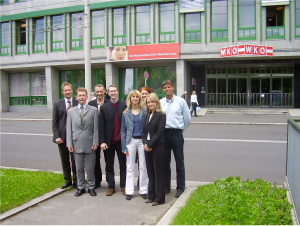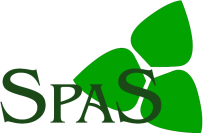ITG Salzburg disseminates SPAS (Mailing in the region of Upper Austria)
The third possibility for disseminating SPAS in Austria was taken on the 18th of September 2006 in the region of Upper Austria. The food cluster in the capital of this region (Linz) sent a mailing in cooperation with the ITG Salzburg to around 190 members of their cluster.
Please find below the german email to these 190 SMEs of the food sector:
sehr geehrter Cluster-Partner,
beiliegend dürfen wir Ihnen eine Information der Lebensmittelinitiative der ITG Salzburg weiterleiten:
Im Rahmen eines 2-jährigen EU-Projektes namens SPAS wird versucht, klein- und mittelständische Unternehmen aus dem Landwirtschafts- und Nahrungsmittelsektor dahingehend zu unterstützen, am (6.) und 7. EU-Rahmenprogramm oder an anderen europäischen F&E-Projekten teilzunehmen. Die Lebensmittelinitiative der ITG Salzburg ist darin als österreichischer Partner vertreten.
Dabei bietet SPAS ein Online-Self-Assessment/Audit mittels eines einfachen Fragebogens an. Jedes Unternehmen, das diesen Fragebogen ausfüllt, profitiert dabei von einer individuellen Stärken- Schwächen-Analyse, die es in Folge zugesendet bekommt. Wenn ein Unternehmen danach verstärktes Interesse hat, kann nach dem ersten Fragebogen eine Vertiefung stattfinden. Dabei wird es eine genauere Analyse bzw. Gespräche geben, inwiefern eine Teilnahme am Rahmenprogramm oder an europäischen F&E-Projekten stattfinden könnte. Nähere Informationen finden Sie auch unter http://www.itg-salzburg.at/projekte/spas.html sowie im beiliegenden Informationsfolder.
Bei Interesse am Online-Self-Assessment/Audit sowie Fragen zum SPAS-Projekt stehen wir Ihnen jederzeit gerne zur Verfügung.
Mit freundlichen Grüßen
Ihr Team des LC OÖ
Mag. Michaela Jomrich
Lebensmittel-Cluster OÖ
Service Center
Wirtschaftskammer Oberösterreich
Hessenplatz 3 | 4020 Linz
T 05-90909-3551
F 05-90909-3549
E michaela.jomrich@wkooe.at
W www.lebensmittel-cluster.at www.clusterland.at
Commission reviews achievements of first half of 2006
It looks as though it will be a busy autumn for the Commission with preparations for the launch of the Seventh Framework Programme (FP7), and further discussions needed regarding initiatives such as the European Research Council (ERC) and the European Institute of Technology (EIT).
To put what lies ahead in context, the Commission has published a mid-term review of its work programme, outlining some of the key achievements delivered so far in 2006. They include efforts to implement the renewed Lisbon strategy, as well as proposals to modernise European universities, and establish the EIT.
Since the start of the year, the Commission has adopted 37 out of the 96 objectives set out in its work programme. Principal among them are initiatives to boost the prosperity of the Union, as set out in the renewed Lisbon Strategy.
In June, the Commission proposed a series of measures to increase the competitiveness of small and medium sized enterprises (SMEs), which are seen as essential sources for innovation and job creation. The measures are designed to improve access to external sources of finance, especially risk capital, to enable SMEs to start up and develop. They include the creation of investment readiness programmes; removing obstacles for EU-wide presence of venture capital funds; and making use of financial instruments such as Joint European Resources for Micro to Medium Enterprises initiative (JEREMIE) to obtain a set of financial products specifically engineered for SMEs.
Link to JEREMIE
Igniting ideas in Germany with a high-tech strategy
'In the land of ideas, ideas must also ignite,' said Germany's Minister for Education and Research, Annette Schavan, as she presented the country's 'High-tech Strategy' on 30 August.
Ms Schavan is making 'ignite ideas' the slogan of the strategy, which comprises the development of a single, national plan, 'with which Germany should reach a leading position in European and worldwide future markets', according to the minister. Between now and 2009, the government will invest some €14.6 billion in high-tech.
'All policy areas in research and development will be directed towards this goal. We are creating the framework conditions for more freedom, risk-taking and technology transfer. In the 'Land of Ideas', ideas must also ignite, top achievements in research have to become products quickly,' said Ms Schavan.
A successful high-tech strategy is the only way to ensure prosperity in Germany, and will, according to the minister, create up to 1.5 million new jobs.
The strategy addresses five areas: strong cooperation between science and business; an increased involvement in innovation in the private sector; the dissemination of leading technologies; the internationalisation of research and development (R&D); and funding for talented individuals. 'We want to support talent and ability in all areas, from the natural and technical sciences, to the social sciences, and above all in young people,' said Ms Schavan.
In addition, 17 innovative fields will be targeted. They will include health research, optical technologies, environmental technologies, information and communication technologies (ICT), aeronautics, transport, nanotechnology and biotechnology.
The minister highlighted the significance of the federal government's investment, but called on other parties to match these efforts. 'These investments represent an enormous push. Through them, we are coming a big step closer to the goal of increasing the proportion of GDP spent on R&D to three per cent. The federal government is doing its bit, now it's the turn of the Länder [states] and industry,' said Ms Schavan.
Contact person: For further information, please visit: www.ideen-zuenden.de
ITG Salzburg disseminates SPAS in Upper Austria
The second possibility for disseminating SPAS in Austria was taken on the 31st of May in Linz (Upper Austria) in the regional chamber of commerce. ITG Salzburg and all five Austrian food-clusters/-initiatives were invited to an 'Austrian food-network meeting'. At this Kick-Off ITG had the chance to present the SPAS project in detail to all other Austrian participants, which were very interested in SPAS and the general agro-food sector.

Dissemination in Italy
The 14th June, SPAS project activities were presented in the fair EURO P.A., Rimini, totally dedicated to the local government fields of action, and that meant an opportunity to share experiences and discover new instruments for helping SMEs.
Furthermore, in order to promote direct contacts between Public Administration and companies, the Province of Mantova organised a second meeting dedicated to selected companies potentially involved in the project: the meeting was attended by 15 participants/agro-food SMEs.



